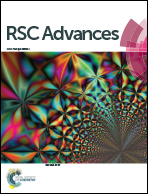RuxSe@MoS2 hybrid as a highly efficient electrocatalyst toward hydrogen evolution reaction†
Abstract
Alkaline hydrogen evolution reaction (HER) requires highly efficient and stable catalytic materials, the engineering of which needs overall consideration of the water dissociation process as well as the intermediate hydrogen adsorption process. Herein, a RuxSe@MoS2 hybrid catalyst was synthesized by the decoration of MoS2 with RuxSe nanoparticles through a two-step hydrothermal reaction. Due to the bifunctionality mechanism in which Ru promotes the water dissociation and the nearby Se atoms, unsaturated Mo and/or S atoms act as active sites for the intermediate hydrogen adsorption, the hybrid catalyst exhibits an exceptional HER performance in basic media with a rather low overpotential of 45 mV at a current density of 10 mA cm−2 and a small Tafel slope of 42.9 mV dec−1. The synergetic effect between RuxSe and MoS2 not only enables more catalytically active sites, but also increases the inherent conductivity of the hybrid catalyst, leading to more favorable HER kinetics under both alkaline and acidic conditions. As a result, RuxSe@MoS2 also demonstrates an enhanced catalytic activity toward HER in 0.5 M H2SO4 in comparison with pure RuxSe and MoS2, which requires an overpotential of 120 mV to deliver a 10 mA cm−2 current density and gives a Tafel slope of 72.2 mV dec−1. In addition, the hybrid electrocatalyst also exhibits superior electrochemical stability during the long-term HER process in both acidic media and alkaline media.



 Please wait while we load your content...
Please wait while we load your content...